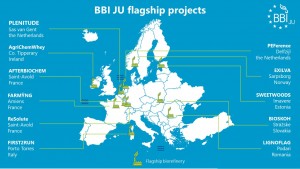A key objective of the Bio-based Industries Joint Undertaking (BBI JU) is to set up first-of-their-kind biorefineries in Europe that produce competitive, sustainable bio-based materials at a large scale by deploying new technologies and business models and respecting zero waste and cascading approaches.
Bio-based products have lower environmental impact than fossil-based ones, as production processes are based on circular use of renewable resources and emit less greenhouse gases. De-risking investments in bio-based industries and connecting production to the market is therefore essential for creating a competitive and sustainable bioeconomy in Europe where economic prosperity goes hand in hand with the protection of the environment.

Since 2014, BBI JU has funded flagship biorefineries in Europe, helping to de-risk investments and develop the sector.
These projects involve 117 beneficiaries including some SMEs from all over Europe as lead investors, but also attract companies from all over the world that are now investing in the EU. The BBI JU beneficiaries have in total received €228 million in BBI JU grants, leveraging €1.3 billion in private investments to support the design and construction of the biorefineries.
BBI JU-funded flagship projects have remarkable socio-economic impacts in European regions, as they are creating 3,500 new direct jobs and 10,000 indirect ones, mainly in rural and coastal areas, thus contributing to the revitalisation of these regions.
The BBI JU-funded flagship biorefineries were selected for their high replicability potential: the business models developed by each project can be applied in other bio-based industries, thus spurring innovation and boosting the bio-based economy in Europe.
Additionally, they support the transition towards a more resource-efficient and sustainable low-carbon economy: by delivering bio-based products that replace fossil-based ones, they save 600 kT of CO2 emissions per year and avoid depleting fossil resources.
Achievements of BBI JU-funded flagship projects
So far, two BBI JU-funded flagship projects have been concluded. The First2Run project boosted the local economy of Sardinia, in Italy, where it turned arid, marginal lands into a sustainable business and created new jobs. This was achieved building a biorefinery to convert cardoon seeds from these lands into oil that can be used for bio-based products.
The biorefinery built by the EXILVA project in Sarpsborg, Norway, produces bio-based microfibrillated cellulose for a wide range of applications including body care products, pharmaceuticals, adhesives, composites, resins, and agricultural chemicals. The project developed a production process that results in fewer CO2 emissions compared to traditional methods and created employment throughout the entire value chain.
Expected impacts of other flagship projects
Other flagship projects are ongoing and already delivering positive socio-economic and environmental impacts.
As example, the LIGNOFLAG project is building a biorefinery transforming agricultural waste into cellulosic bioethanol. The new plant is located in Podari, Romania, where it is creating 1,200 new green jobs and new business opportunities especially for primary producers.
The FARMYNG project is developing the world’s first industrial process to convert agri-food sidestreams with mealworms into proteins for animal feed and organic fertiliser. The project is generating employment in Hauts-de-France, a rural region that is facing depopulation while developing a business model that will be replicated in other parts of Europe.
Source
BBI, press release, 2021-03-23.
Supplier
Share
Renewable Carbon News – Daily Newsletter
Subscribe to our daily email newsletter – the world's leading newsletter on renewable materials and chemicals










